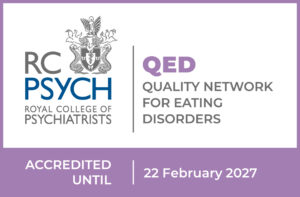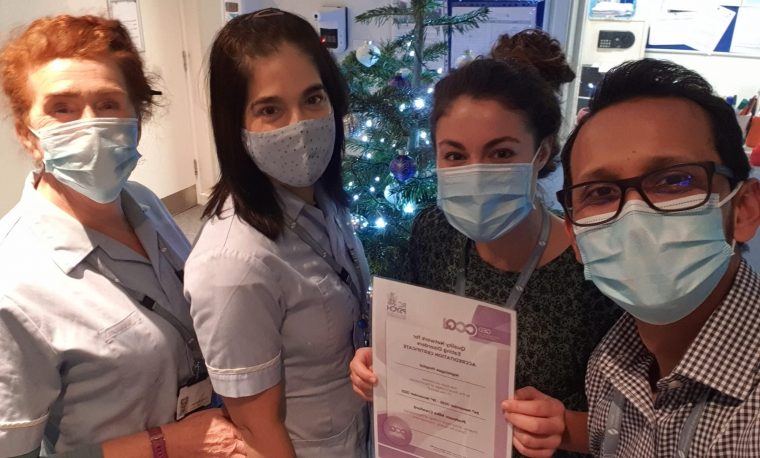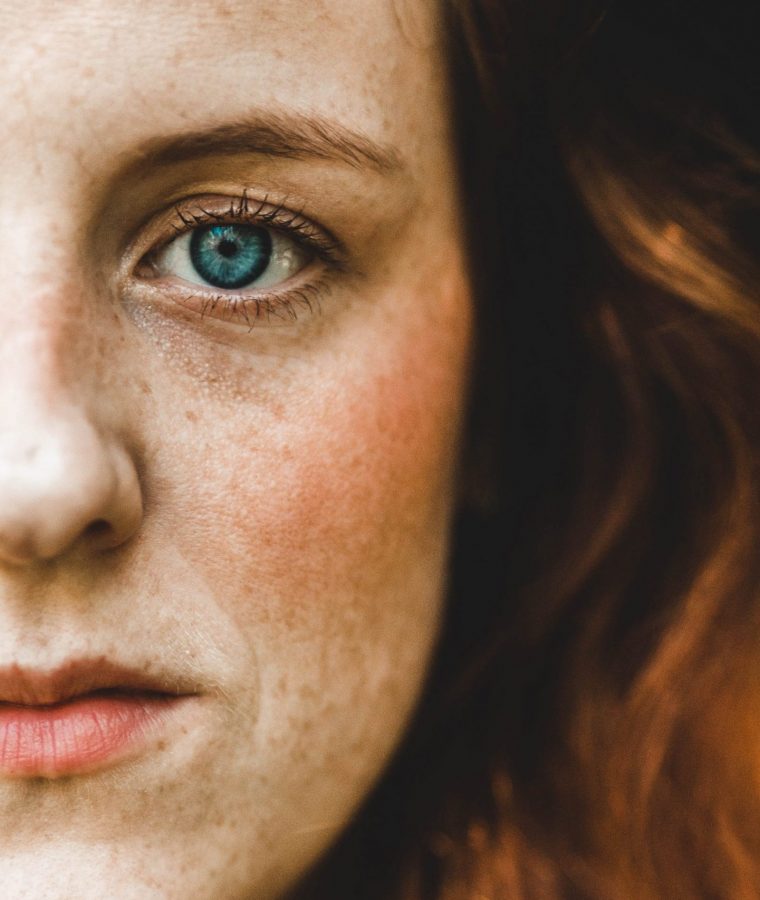Anorexia nervosa
Sometimes our relationship with food can be damaging by feeling like the only part of life we can control. Food begins to represent everything negative, so eating habits develop into extreme patterns such as excessive lowering of food intake, missing meals and altering what you eat.
The loosing of weight can make you feel safe and become a response to low self-worth, extreme fear of rejection and a distorted self-image and this is known as anorexia nervosa.
You can recover from anorexia nervosa and improve the quality of your life, and at Nightingale Hospital we can help you take that vital step to regain a healthy and happy life.
Signs and symptoms of anorexia
You may find that you:
- Worry more and more about your weight
- Eat less and less
- Exercise more and more, to burn off calories
- Can’t stop losing weight, even when you are well below a safe weight for your age and height
- Smoke more or chew gum to keep your weight down
- Lose interest in sex
- In girls or women – monthly menstrual periods become irregular or stop
- In men or boys – erections and wet dreams stop, and testicles shrink
When does it start?
Usually in the teenage years and affects around:
- 1 fifteen-year-old girl in every 150
- 1 fifteen-year-old boy in every 1000
- It can also start in childhood or in later life
What happens?
- You take in very few calories every day. You eat ‘healthily’ – fruit, vegetables and salads – but they don’t give your body enough energy.
- You may also exercise, use slimming pills, or smoke more to keep your weight down.
- You don’t want to eat yourself, but you buy food and cook for other people.
- You are still hungry and can’t stop thinking about food.
- You become more afraid of putting on weight and more determined to keep your weight well below normal.
- Your family may be the first to notice your thinness and weight loss.
- You may find yourself lying to other people about the amount you are eating and how much weight you are losing.
- You may also develop some of the symptoms of bulimia. Unlike someone with Bulimia Nervosa, your weight may continue to be very low.
How can anorexia affect you?
As with all eating disorders, if an individual isn’t getting enough calories, they may experience a mix of psychological and physical consequences.
Behavioural symptoms
- Sleep badly
- Find it difficult to concentrate or think clearly about anything other than food or calories
- Feel depressed
- Lose interest in other people
- Become obsessive about food and eating (and sometimes other things such as washing, cleaning or tidiness)
Physical symptoms
- Find it harder to eat because the stomach has shrunk
- Feel tired, weak and cold as the body’s metabolism slows down
- Become constipated
- Not grow to their full height
- Get brittle bones that break easily
- Become unable to get pregnant
- In extreme cases, death. Eating disorders have the highest death rate of any psychological disorder
If individuals practice self-induced vomiting, they may
- Lose teeth enamel
- Experience bloating or puffiness in the face, due to the salivary glands in the cheeks swelling
- An irregular heartbeat or heart palpitations
- Feel weak
- Feel tired all the time
- Damage the kidneys
- Have epileptic fits
- Be unable to get pregnant
If an individual uses laxatives regularly, they may
- Have persistent stomach pain
- Get swollen fingers
- Find themselves unable to use the toilet anymore without using laxatives (as laxatives can damage the muscles in the bowel)
- Experience fluctuating weight
Download the programme brochure
You can view a copy of the programme brochure by completing the form below.
Treatment for anorexia nervosa at Nightingale Hospital
Nightingale Hospital has a Quality Eating Disorder accreditation, provided by the Royal College of Psychiatrists. This means that when you’re seeking eating disorder treatment at Nightingale Hospital, you can be sure that you will be receiving trusted and effective clinical care of the highest degree.

Treatments for anorexia at Nightingale Hospital London can be accessed as outpatient therapy, day patient therapy or an inpatient. We have the expertise in eating disorders to approach the support and treatment we offer adults and adolescents in a personal and flexible way to benefit you the most in your recovery.
Our approach to eating disorder treatment is tailored to the individual. This is based on current clinical evidence and put into practice by an experienced, multidisciplinary team of consultant psychiatrists, unit doctors, nurses, a dietitian and specialist therapists.
Therapies and treatments for anorexia
At Nightingale Hospital, through intensive psychological and emotional support in group therapy sessions, individual counselling and psychotherapy, we can help to identify the underlying factors that have contributed to anorexia and find personalised strategies to overcome this eating disorder.
- Cognitive behavioural therapy (CBT) can help you identify your negative thoughts and learn more positive emotional and behavioural responses to your beliefs about yourself and your eating.
- Family therapy can improve the way family members relate to each other and communicate and occupational therapy can support you practically in returning to a normal life away from anorexia nervosa.
- Through therapy, education and alternative supportive approaches such as art and drama therapy, meditation and relaxation, life skills, sleep therapy and support groups, we aim to give the knowledge and coping skills to recover from anorexia.
Aftercare for anorexia inpatient and day patients
It can be difficult adjusting to life after an inpatient admission, so we offer a step-down programme for our eating disorders daycare, individual counselling and free aftercare groups post inpatient treatment to sustain motivation for living free from an eating disorder.
Family support groups for anorexia inpatient and day patients
Those nearest to the sufferer often blame themselves, going through a range of emotions from despair, depression and guilt to anger and frustration. This can lead to exhaustion, difficulty in coping, as well as feeling powerless in how to deal with the situation.
Research has shown that the involvement of families in the treatment process greatly increases the prospects of a person’s recovery.
Recent family support group feedback
- “It was good to meet up with other people who understand the complexities of caring for a loved one with an eating disorder. The group was well-led. Joanna is very knowledgeable and took the time to listen to everyone even though there were many needs and people at different stages of the journey.”
- “We cannot thank you enough for the education and advice this group has offered and the chance to discuss our questions with you and other careers of loved ones. We would be grateful if we could attend future Zoom meetings. We have started to read the advised book and already this is becoming of great help. Thank you again, Joanna.”
Anorexia nervosa specialists at Nightingale Hospital
Nightingale Hospital London has a number of Consultant Psychiatrists and Specialist Therapists that can help you through your anorexia. It is vital you find an eating disorder specialist that you can trust and work with on your recovery.
Our team is led by:
- Dr Helen Murphy – Lead Consultant for Eating Disorders, Consultant Psychiatrist at Nightingale Hospital
Please contact us confidentially on 020 7535 7700 24 hours a day.
How you can help yourself with your anorexia
Helping yourself
Anorexia usually needs more organised help from a clinic or specialist eating disorder therapist. It is still worth getting as much information as you can about the options so that you can make the best choices.
Do:
- Stick to regular mealtimes – breakfast, lunch and dinner. If your weight is very low, have morning, afternoon and night-time snacks.
- Take baby steps – Try to think of one small step you could take towards a healthier way of eating. If you can’t face eating breakfast, try sitting at the table for a few minutes at breakfast time and just drinking a glass of water. When you have got used to doing this, have just a little to eat, even half a slice of toast – but do it every day.
- Keep a diary – of what you eat, when you eat it and what your thoughts and feelings have been every day. You can use this to see if there are connections between how you feel, what you are thinking about, and how you eat.
- Be honest – Try to be honest about what you are or are not eating, both with yourself and with other people.
- Give yourself a break – Remind yourself that you don’t always have to be achieving things – let yourself off the hook sometimes.
- Stay positive – Remind yourself that, if you lose more weight, you will feel more anxious and depressed.
- Make two lists – one of what your eating disorder has given you, and one of what you have lost through it. A self-help book can help you with this.
- Be kind to yourself – Try to be kind to your body, don’t punish it.
- Set a goal – Make sure you know what a reasonable weight is for you and that you understand why.
- Read stories – of other people’s experiences of recovery. You can find these in self-help books or on the internet.
- Help yourself – Think about joining a self-help group. Your GP may be able to recommend one, or you can contact Beat.
Don’t:
- Weigh yourself more than once a week.
- Spend time checking your body and looking at yourself in the mirror. Nobody is perfect and the longer you look at yourself, the more likely you are to find something you don’t like. Constant checking can make the most attractive person unhappy with the way they look.
- Cut yourself off from family and friends. You may want to because they think you are too thin, but they can be a lifeline.
- Avoid websites that encourage you to lose weight and stay at a very low body weight. They encourage you to damage your health, but won’t do anything to help when you fall ill.
Please call us on 020 7535 7700 to find out how we can help you.
Additional information help and support for anorexia
- You can find out more about anorexia on the NHS website.
- You can also talk in confidence to an adviser from the eating disorders charity Beat by calling its adult helpline on 0808 801 0677 or youth helpline on 0808 801 0711.




















